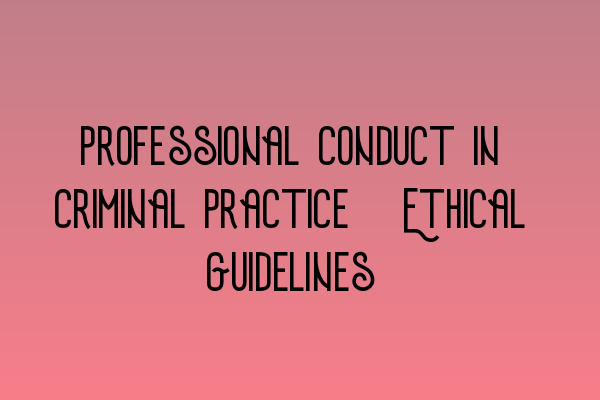Professional Conduct in Criminal Practice: Ethical Guidelines
As a solicitor specializing in criminal law, it is crucial to understand and adhere to the ethical guidelines that govern our profession. Professional conduct plays a significant role in maintaining the integrity of the legal system and ensuring justice is served. In this article, we will explore the essential ethical guidelines that every criminal practitioner should follow.
1. Confidentiality and Privilege
Confidentiality is the cornerstone of the solicitor-client relationship. It is imperative to maintain the utmost confidentiality when dealing with clients’ information and confidences. Not only does this build trust with our clients, but it also ensures that they feel safe and supported throughout the legal process.
Legal privilege is closely tied to confidentiality. It protects the confidentiality of communications between a solicitor and their client. Understanding the nuances of legal privilege is vital to safeguarding client confidentiality and providing effective representation.
For more information on the importance of maintaining client confidentiality and privilege, read our article on SQE Exam Prep: Essential Study Materials for Aspiring Solicitors.
2. Conflict of Interest
Avoiding conflicts of interest is crucial in criminal practice. Solicitors must ensure that there are no conflicts between their own interests and the interests of their clients. This includes refraining from representing multiple clients with conflicting interests in the same matter.
Identifying potential conflicts of interest requires thorough research and due diligence. By maintaining a comprehensive conflict-checking system, solicitors can mitigate any potential ethical issues and provide unbiased and diligent representation to their clients.
To learn more about conflict of interest and its implications in the legal profession, check out our article on Demystifying the Solicitors Qualifying Examination Format.
3. Integrity and Honesty
Integrity and honesty are paramount in criminal practice. Solicitors should always act in a manner that upholds the integrity of the legal profession and the justice system. They must be honest with their clients, the court, and other parties involved in the case.
When presenting evidence or making submissions to the court, solicitors should do so with honesty and accuracy. Misleading the court or presenting false information can have severe consequences, not only for the solicitor but also for the administration of justice as a whole.
To understand the role of integrity and honesty in legal practice, our article on SQE Exam for International Lawyers: Challenges and Success Strategies provides valuable insights.
4. Fairness and Impartiality
Solicitors have a duty to act fairly and impartially in criminal cases. This means treating all parties involved in the legal process with respect and ensuring that no unfair advantage is given to either side.
Providing unbiased advice and representation to clients is essential. Solicitors should refrain from discriminating against clients based on their race, religion, gender, or any other protected characteristic.
For more information on the importance of fairness and impartiality in legal practice, refer to our article on LLC Formation Made Simple: Step-by-Step Guide for UK Entrepreneurs.
5. Continuing Professional Development
Continuous learning and professional development are vital for solicitors practicing criminal law. Staying updated with the latest legal developments, case precedents, and changes in legislation is essential to provide effective representation to clients.
By engaging in ongoing professional development, solicitors demonstrate their commitment to maintaining high standards of competence and professionalism. It allows us to adapt to the ever-evolving legal landscape and better serve our clients.
To learn more about the importance of continuing professional development, our article on LLC Formation: A Step-by-Step Guide for UK Entrepreneurs offers valuable insights.
Conclusion
Adhering to ethical guidelines is not just a legal requirement; it is crucial to upholding the principles of justice and maintaining the integrity of the legal profession. By prioritizing confidentiality, avoiding conflicts of interest, acting with integrity and honesty, ensuring fairness and impartiality, and engaging in continuous professional development, solicitors can provide the highest standards of representation to their clients.
For more information and resources related to professional conduct in criminal practice, please feel free to explore our website and stay updated with our latest articles.
